unit54 话题阅读与交际
人教版九年级英语上册课件:Unit 5 单元话题阅读与写作课件 (共10张PPT)

人们常用剪纸美化居家环境。特别是在春节和婚庆期间, 剪纸被用来装饰门窗和房间,以增加喜庆的气氛。剪纸最常 用的颜色是红色,象征健康和兴旺。中国剪纸在世界各地都 很受欢迎,经常被用作馈赠外国友人的礼物。
_p_le_a_s_a_n_t_a_t_m__o_s_p_h_e_r_e._T__h_e_c_o_l_o_r_m__o_st__fr_e_q_u_e_n_t_ly__u_s_e_d_i_n__p_a_per _c_u_tt_i_n_g_i_s_r_e_d_,__w_h__ic_h__sy_m__b_o_l_iz_e_s_h_e_a_l_t_h_a_n_d__p_r_o_s_p_e_r_it_y_. ___ _C_h_i_n_e_s_e_p_a_p_e_r__cu__tt_in__g_s _a_r_e_v_e_r_y_p_o_p__u_la_r__a_ro_u__n_d_t_h_e_w__o_r_ld__ _a_n_d__th_e_y__a_r_e_o_f_te_n__g_iv_e_n__a_s_p_r_e_s_e_n_ts__to__f_o_re_i_g_n_f_r_i_en__d_s._____
写作指导 一、当我们介绍某物时,我们需要更多的细节信息,通常 用上“be made of/from/in/by...be used for...”等句式。请你 根据上面短文内容造句。 1. be made of:T_h_e_c_l_o_th__t_ig_e_r_i_s_u_s_u_a_ll_y_m__a_d_e_o_f_c_o_t_to_n__o_r_s_il_k_. 2. be made in:___T_h_e_c_l_o_t_h_t_ig_e_r__is_m__a_d_e__in__C_h_i_n_a___. 3. be made by:_T_h_e__c_lo_t_h_t_i_g_er__is__m_a_d_e__b_y_C__h_i_n_e_se__p_e_o_p_le_. 4. be used for:_T_h_e__cl_o_t_h_t_i_g_er__is__u_se_d__f_o_r_w_a_r_d_i_n_g__o_ff_e_v_i_ls
人教新目标八年级英语下册素材:Unit5 教材分析
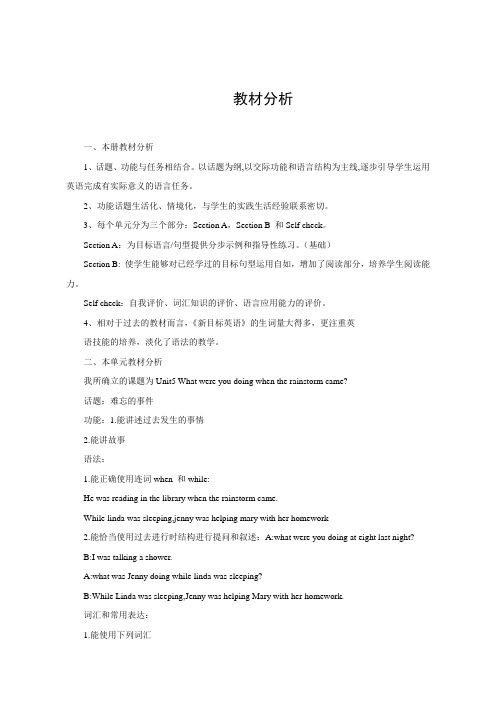
教材分析一、本册教材分析1、话题、功能与任务相结合。
以话题为纲,以交际功能和语言结构为主线,逐步引导学生运用英语完成有实际意义的语言任务。
2、功能话题生活化、情境化,与学生的实践生活经验联系密切。
3、每个单元分为三个部分:Section A,Section B 和Self check。
Section A:为目标语言/句型提供分步示例和指导性练习。
(基础)Section B: 使学生能够对已经学过的目标句型运用自如,增加了阅读部分,培养学生阅读能力。
Self check:自我评价、词汇知识的评价、语言应用能力的评价。
4、相对于过去的教材而言,《新目标英语》的生词量大得多,更注重英语技能的培养,淡化了语法的教学。
二、本单元教材分析我所确立的课题为Unit5 What were you doing when the rainstorm came?话题:难忘的事件功能:1.能讲述过去发生的事情2.能讲故事语法:1.能正确使用连词when 和while:He was reading in the library when the rainstorm came.While linda was sleeping,jenny was helping mary with her homework2.能恰当使用过去进行时结构进行提问和叙述:A:what were you doing at eight last night?B:I was talking a shower.A:what was Jenny doing while linda was sleeping?B:While Linda was sleeping,Jenny was helping Mary with her homework.词汇和常用表达:1.能使用下列词汇alarm, storm, wind, light, area, wood,window, match,passage, pupil, silence, date, tower, truth, begin, report, beat, rise, kid, realize, strange, asleep, fallen, icy, heavily, suddenly, completely, recently, against2.能正常使用下列常用表达:go off, pick up, fall asleep, die down, have a look, make one’s way, in silence, take down, at first3.能认读下列词汇:rainstom, flashlight, apart, shocked, terrorist学习策略:通过文章插图和标题等获取文章的主旨大意,训练快速阅读的技巧文化知识:1.了解美国民权运动领袖马丁•路德•金2.了解震惊世界的9.11恐怖袭击事件。
Unit5LanguagesAroundtheWorld单元分析讲义-高中英语人教版
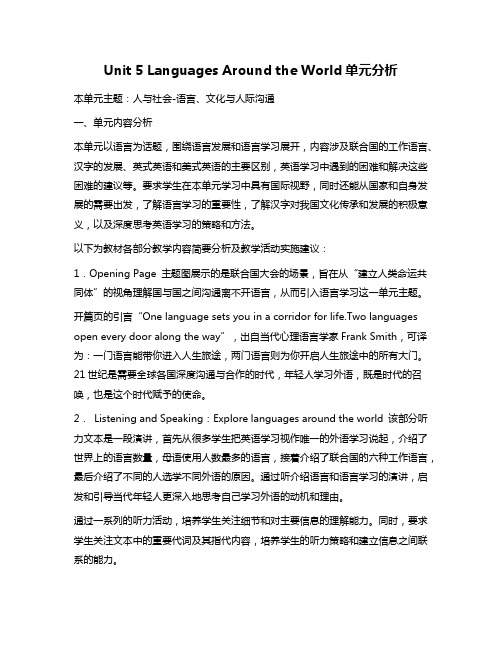
Unit 5 Languages Around the World单元分析本单元主题:人与社会-语言、文化与人际沟通一、单元内容分析本单元以语言为话题,围绕语言发展和语言学习展开,内容涉及联合国的工作语言、汉字的发展、英式英语和美式英语的主要区别,英语学习中遇到的困难和解决这些困难的建议等。
要求学生在本单元学习中具有国际视野,同时还能从国家和自身发展的需要出发,了解语言学习的重要性,了解汉字对我国文化传承和发展的积极意义,以及深度思考英语学习的策略和方法。
以下为教材各部分教学内容简要分析及教学活动实施建议:1.Opening Page 主题图展示的是联合国大会的场景,旨在从“建立人类命运共同体”的视角理解国与国之间沟通离不开语言,从而引入语言学习这一单元主题。
开篇页的引言“One language sets you in a corridor for life.Two languages open every door along the way”,出自当代心理语言学家Frank Smith,可译为:一门语言能带你进入人生旅途,两门语言则为你开启人生旅途中的所有大门。
21世纪是需要全球各国深度沟通与合作的时代,年轻人学习外语,既是时代的召唤,也是这个时代赋予的使命。
2.Listening and Speaking:Explore languages around the world 该部分听力文本是一段演讲,首先从很多学生把英语学习视作唯一的外语学习说起,介绍了世界上的语言数量,母语使用人数最多的语言,接着介绍了联合国的六种工作语言,最后介绍了不同的人选学不同外语的原因。
通过听介绍语言和语言学习的演讲,启发和引导当代年轻人更深入地思考自己学习外语的动机和理由。
通过一系列的听力活动,培养学生关注细节和对主要信息的理解能力。
同时,要求学生关注文本中的重要代词及其指代内容,培养学生的听力策略和建立信息之间联系的能力。
高中英语 阅读课教学教案设计 新人教版必修5
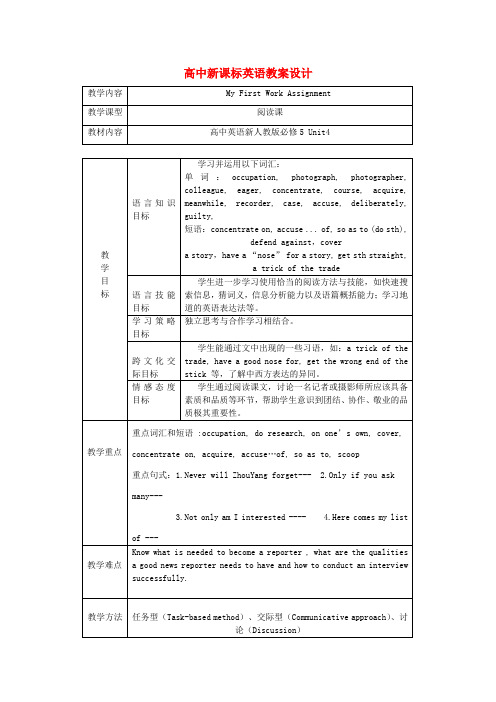
教师活动
学生活动
设计意图
Teaching Procedure
Step I: Lead-in & Warming up
(5m)
1. A free talk about students’ future plans and their ideal occupations.
Tip: Whatever you want to be, you need to know a lot about the occupations and prepare yourselves for them from now on.
Q7 Has the boss ever had a case where someone accused the journalist of getting the wrong end of the stick?
How to deal with accusations of printing lies?
①语言知识目标
学习并运用以下词汇:
单词:occupation, photograph, photographer, colleague, eager, concentrate, course, acquire, meanwhile, recorder, case, accuse, deliberately, guilty,
短语:concentrate on, accuse ... of, so as to (do sth), defend against,cover
a story,have a“nose”for a story, get sth straight, a trick of the trade
牛津译林版九年级上册Unit5《ArtWorld》说课稿6

牛津译林版九年级上册Unit 5《Art World》说课稿6一. 教材分析《牛津译林版九年级上册Unit 5》是一篇关于艺术世界的文章,介绍了不同种类的艺术形式,如绘画、雕塑、音乐等,以及它们在人们生活中的重要性。
通过学习这篇课文,学生可以了解到各种艺术形式的特点,提高自己的艺术修养,同时培养自己的英语阅读能力。
二. 学情分析九年级的学生已经具备了一定的英语基础,能够理解和运用一些基本的英语语法和词汇。
但是,对于一些专业的艺术术语和复杂的句子结构,学生可能还有一定的困难。
因此,在教学过程中,需要根据学生的实际情况,适当调整教学内容和教学方式。
三. 说教学目标1.知识目标:学生能够掌握文章中出现的艺术术语和关键词汇,如pnting、sculpture、music等。
2.能力目标:学生能够运用所学的词汇和语法,进行简单的英语阅读和写作。
3.情感目标:学生能够了解艺术的重要性,提高自己的艺术修养,培养对艺术的热爱。
四. 说教学重难点1.重点:文章中出现的艺术术语和关键词汇。
2.难点:一些复杂的句子结构和艺术专业知识。
五. 说教学方法与手段1.交际式教学法:通过小组讨论、问答等形式,激发学生的学习兴趣,提高学生的参与度。
2.情境教学法:通过展示图片、视频等,为学生创设直观的学习情境,帮助学生更好地理解和记忆。
3.任务型教学法:通过完成具体的任务,如查找信息、总结文章等,培养学生的实际应用能力。
六. 说教学过程1.导入:通过展示一些艺术作品,如绘画、雕塑等,引导学生进入艺术世界的话题。
2.阅读理解:学生自主阅读课文,回答相关问题,检查学生对文章内容的理解。
3.词汇学习:教师讲解文章中出现的艺术术语和关键词汇,学生进行相应的练习。
4.句子分析:教师分析文章中的一些复杂句子结构,帮助学生理解和掌握。
5.小组讨论:学生分组讨论,分享自己的学习心得和体会,互相交流。
6.课堂小结:教师总结课堂教学内容,强调重点和难点。
人教版八年级英语上册Unit5Reading优秀教学案例

1.划分学生为不同的小组,每组成员分工合作,共同完成任务。
2.鼓励学生进行小组讨论,分享自己的观点和经验,培养团队合作精神和沟通能力。
3.组织小组展示和分享,让学生展示自己的成果,提高表达能力和自信心的同时,也让其他学生进行评价和借鉴。
(四)反思与评价
1.学生在学习过程中进行自我反思,评估自己的学习进度和成果,发现问题并进行改进。
2.学生之间进行互相评价,给出建设性的建议和意见,促进共同进步。
3.教师对学生的学习情况进行总结和评价,及时给予反馈,指导学生下一步的学习方向。
四、教学内容与过程
(一)导入新课
1.利用多媒体展示一张野生动物的图片,如大熊猫,引发学生对野生动物的兴趣。
2.提问学生:“你们知道大熊猫目前的生活状况吗?”引导学生思考野生动物保护的重要性。
五、案例亮点
1.情景创设:通过利用多媒体展示野生动物的图片和视频,引发学生对野生动物的兴趣和好奇心,激发学生的学习动机。这种情景创设的方式使得学生能够更加直观地感受到野生动物的可爱和保护的重要性,增强了学生的学习体验。
2.问题导向:设计了一系列问题,引导学生思考野生动物保护的原因和重要性,激发学生的思维能力。通过问题的引导,学生能够深入阅读课文,理解文章的主旨和细节信息,提高阅读理解能力。同时,问题的设计也鼓励了学生主动思考和提出自己的问题,培养他们的问题意识和解决问题的能力。
3.简要介绍本节课的主题和目标,激发学生的学习兴趣。
(二)讲授新知
1.教师带领学生学习本节课的重点词汇和句型,如“endanger”、“species”、“protect”等,并通过例句展示词汇和句型的运用。
2.通过阅读课文,引导学生理解文章的主旨大意,掌握文章的基本框架和逻辑关系。
九年级英语人教版全册 Unit5_同步话题阅读与答案详解
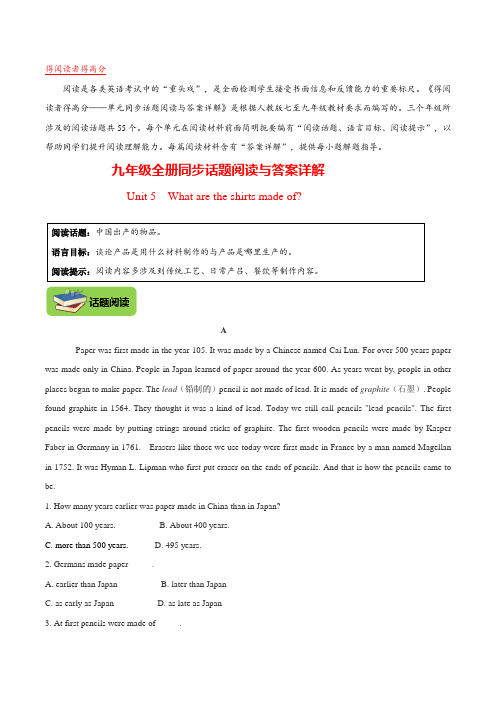
得阅读者得高分阅读是各类英语考试中的“重头戏”,是全面检测学生接受书面信息和反馈能力的重要标尺。
《得阅读者得高分——单元同步话题阅读与答案详解》是根据人教版七至九年级教材要求而编写的。
三个年级所涉及的阅读话题共55个。
每个单元在阅读材料前面简明扼要编有“阅读话题、语言目标、阅读提示”,以帮助同学们提升阅读理解能力。
每篇阅读材料含有“答案详解”,提供每小题解题指导。
九年级全册同步话题阅读与答案详解Unit 5 What are the shirts made of?阅读话题:中国出产的物品。
语言目标:谈论产品是用什么材料制作的与产品是哪里生产的。
阅读提示:阅读内容多涉及到传统工艺、日常产吕、餐饮等制作内容。
话题阅读APaper was first made in the year 105. It was made by a Chinese named Cai Lun. For over 500 years paper was made only in China. People in Japan learned of paper around the year 600. As years went by, people in other places began to make paper. The lead(铅制的)pencil is not made of lead. It is made of graphite(石墨). People found graphite in 1564. They thought it was a kind of lead. Today we still call pencils "lead pencils". The first pencils were made by putting strings around sticks of graphite. The first wooden pencils were made by Kasper Faber in Germany in 1761. Erasers like those we use today were first made in France by a man named Magellan in 1752. It was Hyman L. Lipman who first put eraser on the ends of pencils. And that is how the pencils came to be.1. How many years earlier was paper made in China than in Japan?A. About 100 years.B. About 400 years.C. more than 500 years.D. 495 years.2. Germans made paper _____.A. earlier than JapanB. later than JapanC. as early as JapanD. as late as Japan3. At first pencils were made of _____.A. woodB. leadC. sticksD. strings and graphite4. Kasper Faber was _____.A. an EnglishmanB. a FrenchmanC. a GermanD. an American5. Which of the following statements is NOT true?A. Paper was first made in China.B. Graphite isn’t a kind of lead.C. The first wooden pencils were made in Germany.D. Hyman L. Lipman made the first erasers.BDrinking tea is an important part of Chinese culture. It is seen as the national drink in China.The most common types of Chinese tea are as follows.Green Tea is the oldest and most popular. It has a pale color and a sharp flavor(口味).It is produced mainly in Anhui and Zhejiang. The most popular is Longjing Tea, which is produced near West Lake, Hangzhou.Red Tea (Black Tea) is the second most popular type of Chinese tea. It can help treat stomachaches. Dianhong and Yixing are popular sorts of red tea.Wulong Tea, also known as blue tea, has the advantages of green and red teas.It has a gentle flavor and can help people lose weight. Tie Kuanyin Tea in Anhui and Dongding Wulong Tea in Taiwan are two well-known types of it.Scented Tea(花茶) is created by mixing tea leaves with flowers. It is known by its strong fragrance(芳香) , and it can help people feel comfortable after drinking. Iasmine(茉莉) tea is the most popular of this kind.Tips of Tea DrinkingDo you know how to drink tea in a right way? Here are some tips:Drink it hot.Don’t drink too much strong tea.The best time to drink tea is between meals.Drink tea a couple of hours after taking medicine.Green tea is the best choice for office workers.6.___________is the oldest and most popular tea in China.A.Wulong TeaB.Scented TeaC.Red TeaD.Green Tea7.Red Tea can__________.A.help people lose weightB.help people feel luckyC.help treat stomachachesD.help people sleep well8.Dongding Wulong Tea is produced inA.TaiwanB.YixingC.AnhuiD.Hangzhou9.The right way to drink tea is___________.A.to drink it coldB.to drink between mealsC.to drink much strong teaD.to drink with medicine10.The passage mainly tells us that __________.A.Tips of Tea DrinkingB.Chinese tea can help people lose weightC. tea culture and the most common types of Chinese teaD.the price of Chinese teaCSince last year, city streets around China have seen colorful shared bikes, which people can rent with a smartphone(智能手机)app and then park wherever they choose. To reduce traffic jams and air pollution, many cities have offered bike-sharing. But sometimes, dreams can turn sour.As shared bikes become more popular, problems keep showing up. According to news reports, shared bikes are badly treated by users. When people are using the bike, some of them just throw it onto streets and even into ditches(水沟). Some bikes are stolen. Recently, a man in Shanghai was fined (罚款)1,000 yuan for stealing a shared bike.Besides, the damage to the QR codes on the bikes has brought huge losses to bike-sharing companies, like Mobike. If the QR code is damaged, the bike cannot be used any more. It can take several hundred yuan for the company workers to find a lost bike and get it repaired.Mobike has 100 credit (信用) scores for each user. Penalty (惩罚)points will be taken in case of users’ badbehaviors. Once the score drops to below 80, bike rental will go up to five yuan per 30 minutes.However, punishment may not be the best way to stop shared bikes from being stolen or damaged. Bike-sharing services will work well only if people follow the rules and show respect for the bikes and other users.11. Why do many cities have offered bike-sharing?A.To provide convenience to travelers.B. To reduce traffic jams and air pollution.C. To make money for the company by renting.D. To encourage more people to excise by riding.12. If Mr. Li credit scores is 80, he should pay for _____ his one hour’s riding shared Mobike.A. five YuanB. eighty YuanC. ten YuanD. fifteen Yuan13. The underlined word “loss” may means ______.A.损失B. 利益C. 回报D. 深思14. Which of following is NOT true according to the passage?A. People can rent the shared bikes with a smartphone app.B. If someone steals a shared bike, he will be fined.C. If the QR code is damaged, the shared bike can’t be used any more.D. Punishment is the best way to stop shared bikes from being damaged.15. The author mainly wants to tell us _______ in this passage.A. shared bikes are popular in the citiesB. China’s bike-sharing dreams turn sourC. credit scores of Mobike are important for every usersD. bike-sharing companies are facing serious problemDThe most common things, from paper to clay to bamboo, are turned into objects of beauty.Spring Festival, they are put on windows, doors and walls as symbols of wishes for good luck anda happy new year. Chinese clay art is famous because the clay pieces are so small but they look very real. Thepieces are carefully shaped by hand from a very special kind of clay and thenallowed to air-dry, _________19__________They are then polished and painted. Finally materialsuch as wood or paper are added to make different things _________20________ These small pieces of clay art show the love that all Chinese people have for life and beauty.阅读下面短文,掌握其大意,然后根据短文内容从下面方框的七个选项中,选择五个还原到文中,使短文意思通顺、结构完整。
沪教版三年级英语Unit 5 My family (Period 4) 教学设计

单元教学设计框架课题:Unit 5 My family一、学情分析小学三年级学生正处于生长发育的关键期,他们好奇心强、善于模仿、活泼好动,乐于参与竞赛性、趣味性强的活动。
在之前的英语学习中,他们已经学习过常见的家人称呼,如mother, father, grandmother, grandfather等,并能简要介绍他人与自己的关系,如This is my…;还能简要介绍他人的外貌特征、能力兴趣等,如He/She is… ,He/She can…。
他们对于家庭成员的称谓、姓氏以及中西方姓名表述的差异还不了解,需要通过更深入的学习来获取相关知识。
他们已经初步接触过字母发音的学习,能认读字母,但对字母大小写的书写规范、占格要求还较为陌生,需要书写示范的指导。
二、教材分析本单元学习内容为三年级上册Module 2, Unit 5 My family。
单元主题是介绍家庭成员,包括询问和回答他们的家庭关系、称谓、姓名等信息。
重点词汇有father, mother, brother, sister, me, who等;重点句型包括一般疑问句“Who is she/he?”及其回答“She/He is my…”。
单元的学习难点在于询问和回答一家人的姓名,其中包含中西方姓名的表达顺序差异的文化知识学习。
通过学习本单元,学生能够更深入地理解家庭结构,更具体地介绍自己的家人信息并询问他人的家庭信息,将新旧知识结合运用。
三、单元设计思路和依据依据单元整体设计理念及情景教学法的理念,本单元的设计思路如下:本单元包含5个课时,以Peter作为主线人物,以他的家庭为切入点,向大家层层递进地展示和介绍Peter的家庭信息。
在各个分课时中,Peter将引导着大家,向朋友们介绍家庭成员及他们的姓名(Period 1),展示家人照片并谈论他们的特点(Period 2),分享家庭生活片段并介绍他们的喜好和特长(Period 3),整理家庭信息并制作“家庭树”(Period 4),最后分享一个关于亲情与友情的小故事(Period 5)。
人教版六年级英语上册Unit5Whatdoeshedo单元整体分析
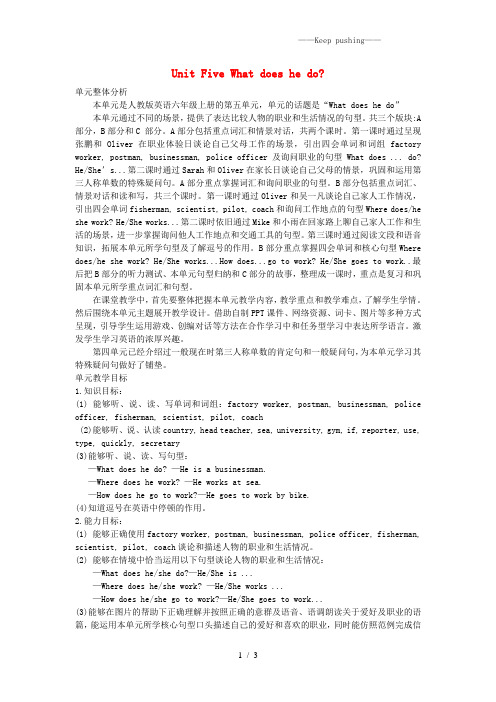
Unit Five What does he do?单元整体分析本单元是人教版英语六年级上册的第五单元,单元的话题是“What does he do”本单元通过不同的场景,提供了表达比较人物的职业和生活情况的句型。
共三个版块:A 部分,B部分和C 部分。
A部分包括重点词汇和情景对话,共两个课时。
第一课时通过呈现张鹏和Oliver在职业体验日谈论自己父母工作的场景,引出四会单词和词组factory worker, postman, businessman, police officer及询问职业的句型What does ... do? He/She’s...第二课时通过Sarah和Oliver在家长日谈论自己父母的情景,巩固和运用第三人称单数的特殊疑问句。
A部分重点掌握词汇和询问职业的句型。
B部分包括重点词汇、情景对话和读和写,共三个课时。
第一课时通过Oliver和吴一凡谈论自己家人工作情况,引出四会单词fisherman, scientist, pilot, coach和询问工作地点的句型Where does/he she work? He/She works...第二课时依旧通过Mike和小雨在回家路上聊自己家人工作和生活的场景,进一步掌握询问他人工作地点和交通工具的句型。
第三课时通过阅读文段和语音知识,拓展本单元所学句型及了解逗号的作用。
B部分重点掌握四会单词和核心句型Where does/he she work? He/She works...How does...go to work? He/She goes to work..最后把B部分的听力测试、本单元句型归纳和C部分的故事,整理成一课时,重点是复习和巩固本单元所学重点词汇和句型。
在课堂教学中,首先要整体把握本单元教学内容,教学重点和教学难点,了解学生学情。
然后围绕本单元主题展开教学设计。
借助自制PPT课件、网络资源、词卡、图片等多种方式呈现,引导学生运用游戏、创编对话等方法在合作学习中和任务型学习中表达所学语言。
(PEP)人教版三年级上册英语Unit5 Let's eat!单元整体分析1-4
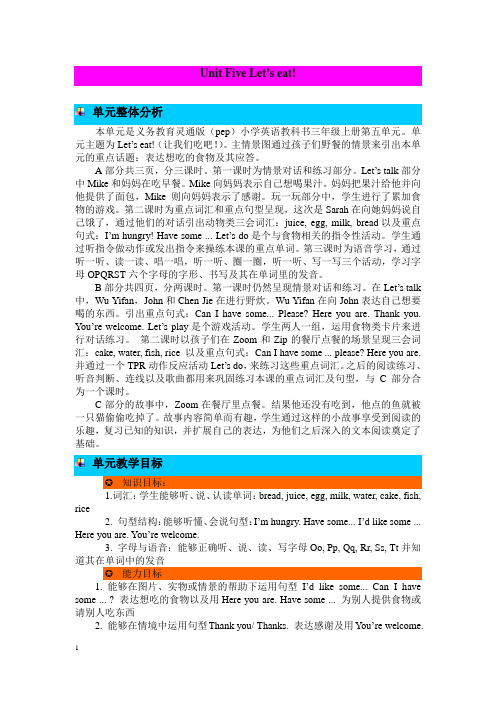
Unit Five Let’s eat!单元整体分析本单元是义务教育灵通版(pep)小学英语教科书三年级上册第五单元。
单元主题为Let’s eat!(让我们吃吧!)。
主情景图通过孩子们野餐的情景来引出本单元的重点话题:表达想吃的食物及其应答。
A部分共三页,分三课时。
第一课时为情景对话和练习部分。
Let’s talk部分中Mike和妈妈在吃早餐。
Mike向妈妈表示自己想喝果汁。
妈妈把果汁给他并向他提供了面包,Mike则向妈妈表示了感谢。
玩一玩部分中,学生进行了累加食物的游戏。
第二课时为重点词汇和重点句型呈现,这次是Sarah在向她妈妈说自己饿了,通过他们的对话引出动物类三会词汇:juice, egg, milk, bread以及重点句式:I’m hungry! Have some ... Let’s do是个与食物相关的指令性活动。
学生通过听指令做动作或发出指令来操练本课的重点单词。
第三课时为语音学习,通过听一听、读一读、唱一唱,听一听、圈一圈,听一听、写一写三个活动,学习字母OPQRST六个字母的字形、书写及其在单词里的发音。
B部分共四页,分两课时。
第一课时仍然呈现情景对话和练习。
在Let’s talk 中,Wu Yifan,John和Chen Jie在进行野炊。
Wu Yifan在向John表达自己想要喝的东西。
引出重点句式:Can I have some... Please? Here you are. Thank you. You’re welcome. Let’s play是个游戏活动。
学生两人一组,运用食物类卡片来进行对话练习。
第二课时以孩子们在Zoom和Zip的餐厅点餐的场景呈现三会词汇:cake, water, fish, rice 以及重点句式:Can I have some ... please? Here you are. 并通过一个TPR动作反应活动Let’s do,来练习这些重点词汇。
人教版八年级英语上册课件:Unit 5 话题阅读与情景交际(共10张PPT)
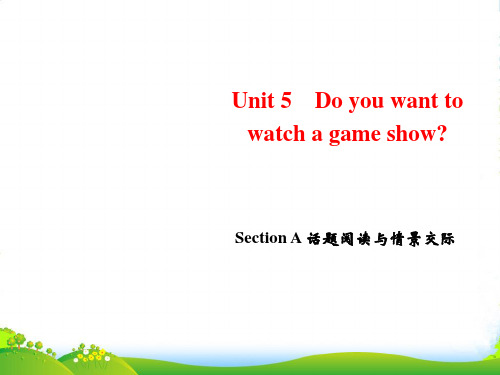
( B )11.Where are Tom and Sue from?
They are from
.
A.England
B.America
C.Japan
D.China
( A )12.What does Mr.Green like?
He likes
.
A.reading and swimming
B.cooking
Unit 5 Do you want to watch a game show?
Section A 话题阅读与情景交际
一、话题阅读。 Ⅰ、完形填空。
I'm a middle school student.I 1 at No.2 Middle School.I like 2 TV very much.I turn on TV first when I come back home after school every afternoon.I like 3 best.I often watch a football game or a basketball game on TV.Sometimes I watch TV for many hours.My mother says,“It's 4 for your eyes. 5 watch TV too much.”But I don't mind that.My sister, Carol,is a 6 girl.She loves 7 .She often watches music shows. 8 favorite music is pop,and she loves English, 9 ,so she enjoys English songs.But she 10 classical music.She thinks it's boring.
2024-2025学年新教材高中英语Unit5Ontheroad理解课文精研读教案外研版必修第二册

本节课的知识点主要围绕外研版必修第二册Unit 5 On the road进行梳理,具体包括以下几个方面:
1.词汇知识点:
-旅行相关的词汇:travel, adventure, journey, route, destination, sightseeing, exploration, culture, language, tradition, accommodation, transportation等。
2024-2025学年新教材高中英语Unit 5 On the road理解课文精研读教案外研版必修第二册
学校
授课教师
课时
授课班级
授课地点
教具
教学内容
本节课的教学内容来自于外研版必修第二册Unit 5 On the road。本节课主要围绕文章"The Adventure of the Engineer"展开,通过阅读理解的方式,让学生掌握文章的主旨大意,深入理解文章中的细节信息,并能够运用所学知识进行口语表达和写作训练。
过程:
分析文章中的关键信息和细节描述,让学生理解作者的观点和态度。
引导学生思考文章中的语言特点和修辞手法,让学生提高语言鉴赏能力。
小组讨论:让学生分组讨论文章中的某个细节或问题,并提出自己的见解和解释。
4.口语表达训练(10分钟)
目标:培养学生的口语表达能力和交流能力。
过程:
将学生分成若干小组,每组选择一个与文章相关的话题进行口语讨论。
2.针对学生思维品质的差异,教师将设计富有挑战性的问题和活动,激发学生的思维活力,培养他们的逻辑思维和批判性思维能力。
3.针对学生文化意识的差异,教师将通过引入真实、生动的跨文化交际场景,提高学生的文化敏感度和跨文化交际能力。
英语(人教版)八年级(上册)Unit 4话题阅读与交际

话题阅读与交际Ⅰ.完形填空。
It was a sunny Sunday afternoon.John's parents were not in.John decided to go to the Happy Theater to watch a talent show,so he __1__ home.Only Barky,John's pet __2__ stayed at home.Just after John left,a bad person __3__ the window,and then he came into the house __4__ it.He began looking for expensive things in the rooms.He found some __5__ in a box.He took out the money,but as he was leaving,he __6__ a dog's barking(叫声).He looked around and found Barky looking at him angrily.He was very scared.Barky was going to bite(咬) him when John came home.John let Barky sit down and told the bad person,“Come with me to the __7__,or Barky will bite you!”So the bad person had to __8__ John to the police station with Barky close behind.A __9__ cuffed (铐) the bad person after John told him the thing.Barky had a(n)__10__ for watching the house.But the bad person didn't know.(A)1.A.left B.stayedC.stopped D.waited(B)2.A.cat B.dogC.bird D.horse(D)3.A.killed B.actedC.touched D.broke(B)4.A.across B.throughC.on D.below(A)5.A.money B.paperC.tickets D.books(B)6.A.worried B.heardC.reached D.chose(C)7.A.radio station B.post officeC.police station D.bus stop(B)8.A.help B.followC.bring D.join(C)9.A.reporter B.guideC.policeman D.teacher(A)10.A.talent B.storyC.example D.serviceⅡ.任务型阅读。
人教版八年级英语下册 Unit 4 单元话题阅读理解

Unit 4 单元话题阅读AOne day, a boy had a fight with one of his classmates. He didn’t wait until school was over, and hurried home to his grandfather. He told him his story angrily. “He is really bad,” the boy said, “and I hate him.”The grandfather said, “Let me tell you a story. When I was a boy, I, too, sometimes hated others for what they did…”As the boy listened carefully, the grandfather went on, “There are always two tigers inside my heart. One is good and kind. He gets on well with everything around him. But the other is bad and unfriendly. Even the smallest thing will make him angry. He fights with everyone all the time, and for no reason. He can’t think carefully because he always hates others. It is difficult to live with these two tigers inside my heart. They both try to control me.”The boy looked into his grandfather’s eyes and asked, “Which tiger always controls you, Grandfather?”The old man said slowly and seriously, “The one that I feed. I always feed the good and kind tiger, so I never hate others and seldom get angry now.”1. The boy went to his grandfather ____.A. before he went to schoolB. when he went to schoolC. after school was overD. after he had a fight2. The good tiger ____ everything around him.A. doesn’t likeB. gets along well withC. isn’t interested inD. wants to eat3. The bad tiger fights with everyone all the time ____.A. because others wants to kill himB. because he wants to eat othersC. for no reasonD. because others aren’t friendly to him4. The good tiger can control the grandfather because ____.A. the good tiger is much strongerB. the good tiger can get along well with othersC. the grandfather treats the tiger very wellD. the grandfather hates the bad tiger5. The writer wants to tell us ____ in the passage.A. how to feed tigers wellB. how to control our feelingsC. how to get along with othersD. how to fight with othersBMaybe you have seen this in schools: some students are studying nearly all the time but they just pass their exams, while some others may spend much less time on their books but do much better in exams. How could this happen? People used to think that hard work is the only way to success. But now they have understood that smart work can make them succeed, too.Hard workers don't mind working for long hours, while smart workers always think of several different answers to these questions, “Why should I suffer this ?” “Isn't there a better way to do this?” Thanks to these people, we can use computers instead of the abacus now. Progress in every field is the direct result of “try to find a better way” by smart workers.There was a large soap factory in Japan. Once it received an unusual letter from someone who complained that there was no soap in the soapbox he bought.How could empty soapboxes go out of the factory? The engineers checked the producing and packing. The producing was fine, but in about one in ten thousand cases, the packing machine (机器) let an empty soapbox go. There was no need to spend a lot of money repairing the machine for such a small problem. The engineer soon worked out a solution; he put a huge Xray machine and two large computers to find out the empty soapboxes. After teaching the workers how to use it, he sat down in his seat, exhausted.“Sir, we could have solved the problems in a much simpler and cheaper way,” a worker said.“Really? How?”“We can put a huge fan near the packing machine. The wind coming from the fan will blow away the empty boxes, leaving the other boxes with soap.”See, this is smart work. In order to succeed, we should not only work hard like theengineer, but also think smart like this worker.1. Some students spend less time on schoolwork but do better in exams ________. A.because of their hard workB.because of different educationC.because they try to find a better wayD.because they study for a much longer time2. Someone wrote to the soap factory and complained that ________.A.the soapbox he bought was empty B.their soap was too expensive C.the soap he bought was terrible D.their service was very bad 3. The soap factory could only ________ near the packing machine to solve the problems in a much simpler and cheaper way.A.set some soapboxes B.set an Xray machineC.put two large computers D.put a huge fan4. The phrase “blow away” in the passage means “________”.A.停止B.远离C.吹走D.逃脱5. The article mainly tells us we should________in order to succeed.A.work hard for long hours and study all the timeB.work hard like the engineer and think smart like the workerC.spend much less time on our schoolwork than beforeD.spend enough money repairing the machine for any problemCBarbara couldn’t stand it anymore. Her upstairs neighbor was blasting(大声播放)his stereo (立体音响设备)again. She had asked him twice already to turn the volume down. The first time she asked, he was surprised. He said he didn’t know that she could hear his stereo. “Yes.”she said,“it’s just like your stereo was in my living room. I can hear every note!”He said he would keep it down. She hoped that he was telling the truth. Of course,he wasn’t. The next day,he blasted his stereo. She went upstairs to remind (提醒)him of his promise. He said the volume was so low that he could hardly hear it. She asked him to turn it lower .He said he would try. When she went back to her room, the music was louder when she had walked upstairs.So, this was the third time. She took her baseball bat upstairs with her. She knocked very loudly on his door. When he opened the door, she screamed (尖叫) at him like a crazy person. She told him she would kill him if he didn’t turn the music down and keep it down. His eyes got big. She went back downstairs. She couldn’t hear a note.1.When Barbara asked her neighbor to turn the volume down at first, he was surprised because ________.A. she was friendly to himB. she was his neighbor downstairsC. he knew the volume was so loudD. he didn’t know she could hear his stereo2.The underlined word in Paragraph Two “promise”means “________”in Chinese.A.工作B.兴趣C.诺言D.责任3.Barbara asked her neighbor to turn the volume down _______.A. onceB. twiceC. three timesD. four times4.When Barbara walked upstairs with a baseball bat, she felt _______.A. happyB. angryC. surprisedD. sad5.Which is TRUE according to the passage?A. The volume was not loud at all.B. Barbara was very interested in the stereo.C. Finally, her upstairs neighbor was more surprised.D. Barbara and her neighbor were good friends.DDear Cindy,In your last letter,you told me that you had no time to spend with your good friends because your parents were too overprotective(过分保护的).And at the same time they had many rules for you at home.I am sorry to hear that.And here is my advice for you.First,you should have a conversation with them and tell them what you really need.At agood time—during a happy family dinner—you can say that you should have some rights and want to spend some time with your best friends having fun.If your parents are against you,you may talk about the advantages(好处) of staying with friends.Second,you can tell them it's not good for your health and study when you always stay at home.You should get out with your friends,hang out with them,and meet new people.It will be a good idea to open up your eyes.Third,if your parents regard study as an excuse for keeping you at home,you should tell them that “ ▲ ”.I really hope you are happy.Your uncle,Bruce ()1.The letter is from .A.CindyB.Cindy's parentC.Cindy's friendD.Cindy's uncle()2.Cindy had no time to spend with her good friends because . A.they were too overprotectiveB.she had lots of homework to doC.her parents didn't allow her to do soD.she argued with them()3.According to the letter,Cindy can have a conversation with her parents . A.at any timeB.at dinnertimeC.after schoolD.before bedtime()4.The underlined words “are against” mean “ ”.A.are pleased withB.don't agree withC.are strict withD.take pride in()5.Which of the followings can be put in “ ▲ ” in Paragraph 4?A.No pain,no gain.B.Practice makes perfect.C.All work and no play makes Jack a dull(迟钝的) boy.D.Actions speak louder than words.FLast month we made a survey among 300 students at our school.The questions we asked were “Who would you talk with when in trouble?”and“Why?”.Here are some answers from them.Zheng Hao I would talk with my parents or teachers when in trouble.They are older than me and have more experience of life.They always listen to me carefully and give me helpful ideas.I trust them.Chen Lei Life is full of small troubles,but I'm never afraid of them.I would talk with my friends when in trouble,because we understand each other and they always give me good suggestions.I won't feel worried.Li Yan I am a quiet girl.I like to keep my secrets(秘密).I think nobody can really understand me except(除了) myself.So I never tell others when I'm in trouble.()1.Zheng Hao likes to talk with his ______ when in trouble.A.parentsB.classmatesC.friendsD.brothers()2. C hen Lei likes to talk with his friends when in trouble because ______.A .they are older than himB .they always give him good suggestionsC .he likes to keep secretsD .they have more experience of life()3.From Li Yan's answer we know she is ______.A .outgoing B.active C.funny D.quiet()4.From the passage we know that ______ often ask others for help.A.Zheng Hao and C hen LeiB.Zheng Hao and Li YanC.Chen Lei and Li YanD.all of the three()5.Which is TRUE according to the passage?A .Chen Lei is afraid to face the troubles in life.B.Zheng Hao and Li Yan like to keep secrets to themselves.C.Li Yan only trusts herself so she never tells others her secrets.D.Zheng Hao doesn't have any friends but C hen Lei has many.GEveryone worries.But how do you deal with your worries?Whether(不管)your worries are big or small,you can take these three steps to deal with your worries:*Try to find out what you're worried aboutSometimes,you will know what you're worried about.Other times,you might not.Try to find it out first;if you can't,you can ask for help.*Think of ways to make it betterThere is always something you can do to help yourself feel less worried.Sitting there worrying is no fun and it won't solve your problem.Grades at school are often a top worry for kids.If you're worried about grades,ask yourself these questions:☆Why are grades important?What do grades mean to me?☆ How do I get ready for class?Do I go over(复习)my notes even when there isn't a test?☆Do I have a good place to do my homework?☆Do I try different ways of studying?If your worry is about a fight you had with a friend,you might write down all the things you could do—write a note to him or her,invite him or her to a basketball game,say sorry to him or her,etc.Once you have a list of things you could do,you can choose the one that gets your friend back.*Ask for helpWhen you're worried,it can help to find someone to talk to.You can ask your parents,friends,or teachers for help.( )1.How many steps of dealing with your worries are mentioned(被提及)in the passage?A.Two.B.Three.C.Four.D.Seven.( )2.When you don't know what you're worried about, .A.you should try to find it outB.you can't ask for helpC.you don't need to think of waysD.you can sit there worrying( )3.If you're worried about grades,you can ask yourself these questions EXCEPT(除了)A.why grades are importantB.what grades mean to meC.how I get ready for classD.why my friends don't like me( )4.According to the passage,what should you do if you have a fight with your friend?A.Make a new friend.B.Don't talk to him or her any more.C.Have another fight with him or her.D.Invite him or her to a basketball game.( )5.The passage mainly tells usA.who is often worriedB.when people are worriedC.how to deal with our worriesD.what kind of worries people have。
牛津译林版-英语-五年级上册-5AUnit4Hobbies全单元教案
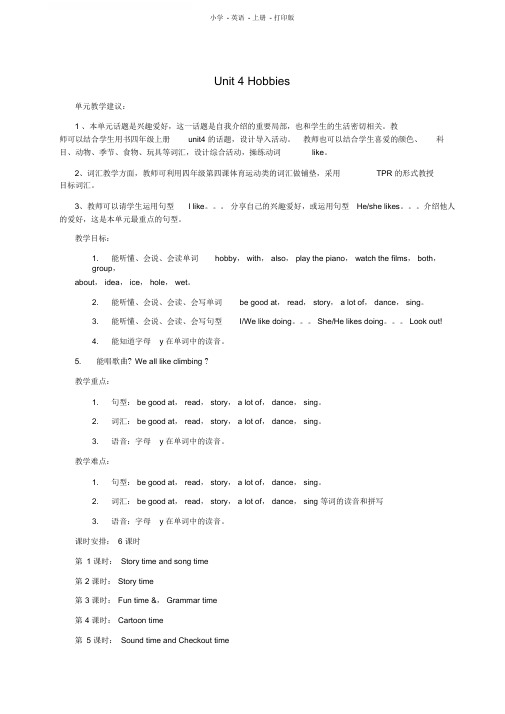
小学- 英语- 上册- 打印版Unit 4 Hobbies单元教学建议:1 、本单元话题是兴趣爱好,这一话题是自我介绍的重要局部,也和学生的生活密切相关。
教师可以结合学生用书四年级上册unit4 的话题,设计导入活动。
教师也可以结合学生喜爱的颜色、科目、动物、季节、食物、玩具等词汇,设计综合活动,操练动词like。
2、词汇教学方面,教师可利用四年级第四课体育运动类的词汇做铺垫,采用TPR 的形式教授目标词汇。
3、教师可以请学生运用句型I like。
分享自己的兴趣爱好,或运用句型He/she likes。
介绍他人的爱好,这是本单元最重点的句型。
教学目标:1. 能听懂、会说、会读单词hobby, with, also, play the piano, watch the films, both,group,about, idea, ice, hole, wet。
2. 能听懂、会说、会读、会写单词be good at, read, story, a lot of, dance, sing。
3. 能听懂、会说、会读、会写句型I/We like doing。
She/He likes doing。
Look out!4. 能知道字母y 在单词中的读音。
5. 能唱歌曲? We all like climbing ?教学重点:1. 句型:be good at, read, story, a lot of, dance, sing。
2. 词汇:be good at, read, story, a lot of, dance, sing。
3. 语音:字母y 在单词中的读音。
教学难点:1. 句型:be good at, read, story, a lot of, dance, sing。
2. 词汇:be good at, read, story, a lot of, dance, sing 等词的读音和拼写3. 语音:字母y 在单词中的读音。
四单元五单元交流的英语作文

四单元五单元交流的英语作文English:In units four and five, we explored various aspects of communication in English. Unit four focused on verbal communication, emphasizing vocabulary, grammar, and pronunciation. We practiced speaking fluently and confidently in different situations, such as introductions, discussions, and giving presentations. Unit five, on the other hand, delved into non-verbal communication, including body language, gestures, and facial expressions. We learned how to interpret and use non-verbal cues effectively to convey our messages accurately. Throughout these units, we discovered the importance of both verbal and non-verbal communication in understanding and expressing ourselves in English, as well as the significance of cultural differences in communication styles. By honing our communication skills in both areas, we are better equipped to interact with others in English-speaking environments and build meaningful connections.中文翻译:在第四和第五单元中,我们探讨了英语交流的各个方面。
英语(人教版)八年级(上册)Unit 5话题阅读与交际

话题阅读与交际Ⅰ.完形填空。
Do you like going to the movies?__1__ of the students like movies very st Friday,I went to a middle school and __2__ some students about their favorite movies.Some of their answers were really interesting.Here are the __3__.Jeff,an 11-year-old boy,likes watching scary movies because they are scary but exciting.Laura __4__ stand documentaries(纪录片).She tells me they are __5__ parents.But she really likes sitcoms because they are __6__.Tony is a big boy.He says he doesn't __7__ documentaries.But he doesn't like sitcoms because he thinks they are __8__.And the coolest movies are action movies.Everyone enjoys __9__ very much.What does Rick like best?Cartoons!He __10__ watches cartoons when he is free.He likes cartoon characters a lot.(C)1.A.Much B.NoneC.Most D.Any(B)2.A.cared B.askedC.answered D.met(D)3.A.points B.programsC.activities D.results(A)4.A.can't B.shouldn'tC.doesn't D.didn't(B)5.A.from B.forC.with D.across(D)6.A.scary B.seriousC.terrible D.funny(C)7.A.stand B.actC.mind D.choose(A)8.A.boring B.interestingC.educational D.exiting(B)9.A.it B.themC.him D.her(A)10.A.always B.everC.almost D.onceⅡ.任务型阅读。
